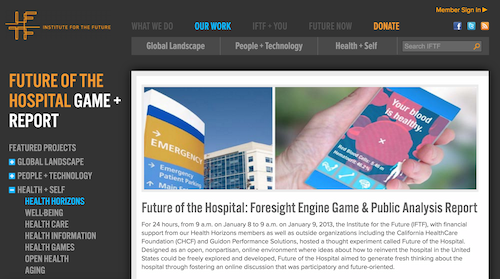Recently I had the opportunity to speak with a group of national medical specialty society CEOs. The topic was innovation and entrepreneurship trends in the market for lifelong learning, and I was thrilled that this turned out to be a very engaged group, one that was eager to talk about what is going on out there in the new learning landscape.
We had great discussion around a range of examples that included the big focus (particularly by investors) on the subject matter entrepreneur market, the critical role of the marketing- education value loop, and the emergence of habit-based platform models like Degreed.
An area that really resonated with this group, though, is the potential for creating large scale, collaborative learning initiatives aimed at tackling big challenges and opportunities.
My main point of reference for this was the work that the Institute for the Future (IFTF) has been doing over the last decade or so. I first became familiar with IFTF’s efforts when they launched a massive alternate reality game several years ago called World Without Oil.
You can read about WWO in detail and get access to the game archives at at https://writerguy.com/wwo/metaabout.htm, but the quick run down is that the game makers posed a scenario in which the world enters into a massive oil shortage. Game players then used their imaginations to engage with the scenario as if it were real and document what happens in the the form of blog posts, Web videos, phone messages, and image. All in all, more than 1,500 posts about the event were collected and analyzed, painting a picture of what we could really expect a world without oil to be like.
That was in 2007. The game is long since over, but IFTF’s work, under the guidance of Jane McGonigal, the organization’s Director of Game Research + Development (and something of a TED star at this point), has continued. An example of a more recent effort – very relevant for the medical society CEOs – is their Future of the Hospital game, which engaged more than 600 people across 500 continents to brain storm about – you guessed it – the future of hospitals.
Does the Institute for the Future actually solve all of the problems it tackles? Of course not. And, of course, this approach may not feel enough like hard science for some observers. But from the standpoint of trade and professional associations – or any other group that wants to facilitate large-scale learning – I think there is a lot to like in their efforts.
First of all, while IFTF now talks about having its own Foresight Engine, the technology they use is not especially complex or costly. World Without Oil made use of widely-available, free tools like blogging platforms and YouTube. The Future of the Hospital game used a Twitter-type platform.
These sorts of initiatives aren’t about the technology any more than they are about arriving at a final solution. They are about the process and the learning that emerges from it. They are about engagement, about raising awareness, about bringing together people with a common interests, and often finding commonalities and sources of collaboration among groups that have not worked together well, if at all, in the past.
Organizations that play a leading role in these sorts of initiatives develop distinctive new capacity for dealing with major changes in the fields and industries they serve. They discover the areas in which more focused educational initiatives may be needed and desired. (Yes, this is market research.) And they bolster their – here comes that word – relevance among the audience they serve and seek to serve.
That’s a lot of potential benefit from thinking about learning a bit differently that the usual “Let’s hold an event” or “Let’s introduce a new course” perspective.
The real work, of course, is in constructing the right scenarios in the first place, and then doing the analysis. In many cases, it will make sense to form partnerships to pursue this type of learning – a point of discussion with the CEO group. That, too, requires work. But the benefits – many already covered above – have the potential to be huge.
In any case, I’ve been fascinated with this approach since first encountering it years ago. If you haven’t already, it’s worth spending some time considering the potential for large scale change in your industry or field – and the role that large scale thinking about learning could serve in making it happen.
Jeff



Leave a Reply